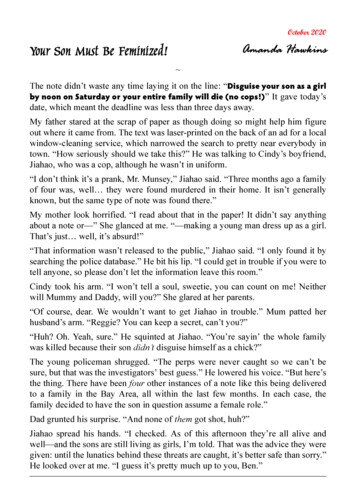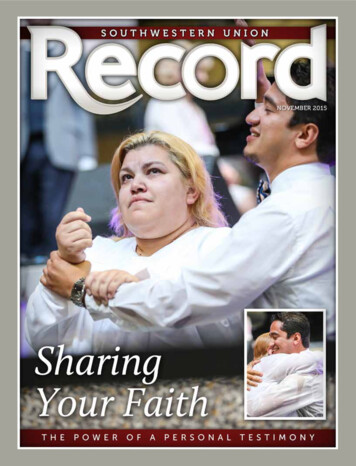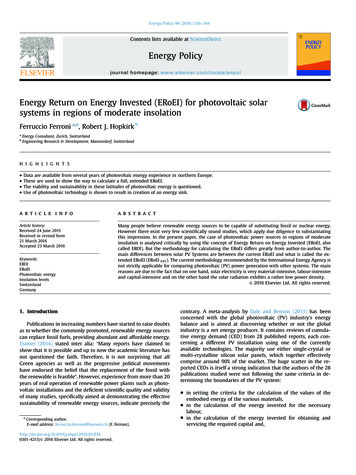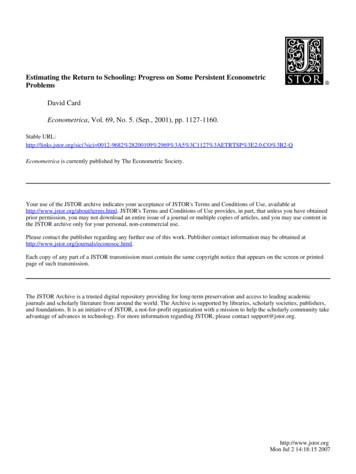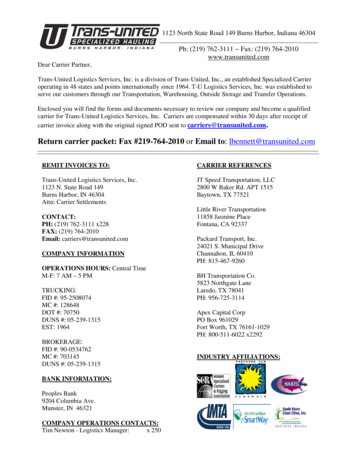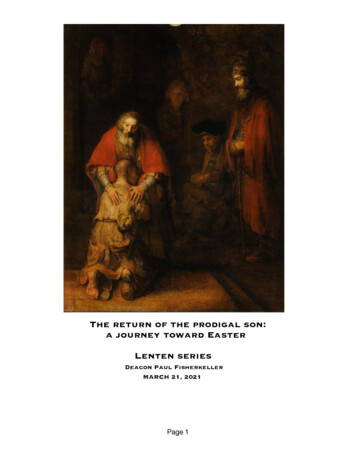
Transcription
The return of the prodigal son:a journey toward EasterLenten seriesDeacon Paul FisherkellerMARCH 21, 2021Page 1
THE PAINTING1. Rembrandt (1606-1669) completed this work within two years of his death. It ispartly autobiographical.2. Rembrandt is as much the elder son of the parable as he is the younger. He hadlived a life in which neither the lostness of the younger son nor the lostness of theelder son was alien to him. Both needed healing and forgiveness. Both needed tocome home. Both needed the embrace of a forgiving father.THE STORY OF TWO SONS AND THEIR FATHER“There was a man who had two sons. The younger one saidto his father, “Father, let me have the share of the estatethat will come to me.” So the father divided the propertybetween them.”1. It is dif cult to understand fully that what is happeninghere because it is an unheard-of event: hurtful, offensive, and in radicalcontradiction to most venerated tradition of the time.2. This painting might well be called “The Parable of the Lost Sons,” or even moreappropriately, ‘The Parable of the Father’s Love.”3. It was love itself that prevented the Father from keeping his son home at all cost. Itwas love itself that allowed him to let his son nd his own life, even with the risk oflosing it. Here the mystery of my life is unveiled. I am loved so much that I am leftfree to leave homeTHE WAYWARD SON“A few days later, the younger son got together everything hehad and left for a distant country.”“He squandered his money on a life of debauchery. When hehad spent it all, that country experienced a severe famine, andnow he began to feel the pinch; so he hired himself out to one ofthe local inhabitants who put him on his farm to feed the pigs.And he would willingly have lled himself with the husks the pigswere eating, but no one would let him have them. Then he cameto his senses and said, “How many of my father’s hired menhave all the food they want and more, and here am I dying ofhunger! I will leave this place and go to my father and say: Father, I have sinnedagainst heaven and against you; I no longer deserve to be called your son; treat meas one of your hired men.” So he left the place and went back to his father.”fififiPage 2
1. Leaving home, in a spiritual sense, is the denial of the spiritual reality that I belongto God with every part of my being, that I am eternally held in his safe andeternal embrace, that I am always God’s Beloved.2. Leaving home is living as though I do not yet have a home and must look far andwide to nd one.3. At issue here is the question: “To whom do I belong? To God or to the world?”4. The world says: “Yes, I love you if you are good-looking, intelligent, and wealthy.I love you if you have a good education, a good job, and good connections. Ilove you if you produce much, sell much, and buy much.” There are endless “ifs”hidden in the world’s love.5. I am the prodigal son or daughter every time I search for unconditional lovewhere it cannot be found. Why do I keep ignoring the place of true love andpersist in looking for it elsewhere?6. The wayward son returns with nothing: his money, his health, his honor, his selfrespect, his reputation everything has been squandered.7. He became fully aware of how lost he was when no one in his surroundingsshowed the slightest interest in him.8. Whatever he had lost, be it his money, his friends, his reputation, his self-respect,his inner joy and peace—one or all—he still remained his father’s child.9. The younger son’s return takes place in the very moment that he reclaims hissonship, even though he has lost all the dignity that belongs to it. In fact, it wasthe loss of everything that brought him to the bottom line of his identity.10. He had become so disconnected from what gives life—family, friends, community,acquaintances, and even food—that he realized that death would be the naturalnext step.11. Once he had come again in touch with the truth of his sonship, he could hear—although faintly—the voice calling him the Beloved and feel—although distantly—the touch of blessing.12. In that critical moment, what was it that allowed him to opt for life? It was therediscovery of his deepest self as the Beloved child of his Father.13. Even so, belief in total, absolute forgiveness does not come readily. One of thegreatest challenges of the spiritual life is to receive God’s forgiveness. There issomething in us humans that keeps us clinging to our sins and prevents us fromletting God erase our past and offer us a completely new beginning.14. Receiving forgiveness requires a total willingness to let God be God and do allthe healing, restoring, restoring, and renewing.fiPage 3
THE ELDER SON“Now the elder son was out in the elds, and on his way back,as he drew near the house, he could hear music and dancing.Calling one of the servants, he asked what it was all about. Theservant told him, “Your brother has come, and your father haskilled the calf we had been fattening because he has got himback safe and sound.” He was angry then and refused to go in,and his father came out and began to urge him to come in; buthe retorted to his father, “All these years I have slaved for youand never once disobeyed any orders of yours, yet you neveroffered me so much as a kid for me to celebrate with my friends.But, for this son of yours, when he comes back after swallowing up your property—heand his loose women—you kill the calf we had been fattening. The father said, “Myson, you are with me always, and all I have is yours. But it was only right we shouldcelebrate and rejoice, because your brother here was dead and has come to life; hewas lost and is found.”1. In the biblical commentaries and paintings of Rembrandt’s time, the parable of thePharisee and the tax collector and the parable of the prodigal son were closelylinked. The standing man looking at the father in a somewhat enigmatic way is theelder son, representing the Pharisees and scribes.2. The elder son son, as the main observer is keeping his distance, seeminglyunwilling to participate in the father’s welcome. What is going on inside this man?What will he do? Will he come closer and embrace his brother as his father did,or will he walk away in anger and disgust?3. Not only did the younger son, who left home to look for freedom and happinessin a distant country, get lost, but the one who stayed home also became a lostman. Exteriorly he did all the things a good son is supposed to do, but, interiorly,he wandered away from his father.4. The lostness of the elder son is much harder to identify. After all, he did all theright things. He was obedient, dutiful, law-abiding, and hardworking. Peoplerespected him, admired him, praised him, and likely considered him a model son.5. Suddenly, there becomes glaringly visible a resentful, proud, unkind, sel shperson, one that had remained deeply hidden, even though it had been growingstronger and more powerful over the years.6. Joy and resentment cannot coexist. The music and dancing, instead of inviting tojoy, become a cause for even greater withdrawal.This experience of not beingable to enter into joy is the experience of a resentful heart7. In response to their complaint, “This man welcomes sinners and eats with them,”Jesus confronted the Pharisees and scribes not only with the return of the prodigalson, but also with the resentful elder son.fifiPage 4
THE FATHER“While he was still a long way off, his father saw him [his youngerson] and was moved with pity. He ran to the boy, clasped him in hisarms and kissed him.“The father said to his servants, “Quick! Bring out the best robe andput it on him; put a ring on his nger and sandals on his feet. Bringthe calf we have been fattening, and kill it; we will celebrate byhaving a feast, because this son of mine was dead and has comeback to life; he was lost and is found.” And they began to celebrate.“ his father came out and began to urge him [his elder son] to come in.“1. The heart of the father burns with an immense desire to bring his childrenhome.God, creator of heaven and earth, has chosen to be, rst and foremost, aFather.2. The Father carries within himself a mysterious inner light, deeply hidden butradiating an all pervasive tender beauty. Not at the center of the canvas, he isnonetheless the one to whom we are immediately drawn.3. From the deep inner place where love embraces all human grief, the Fatherreaches out to his children. The touch of his hands, radiating inner light, seeksonly to heal.fiPage 5fifi8. The father loves both sons. He runs out to meet both. He wants both to sit at histable and participate in his joy.9. God’s love does not depend on our repentance or our inner or outer changes.Whether I am the younger son or the elder son, God’s only desire is to bring mehome.10. The father does not compare the two sons. He loves them both with a completelove and expresses that love according to their individual journeys.11. Each child of God has there his or her unique place, all of them places of God. Ihave to let go of all comparison, all rivalry and competition, and surrender to theFather’s love.12. God is urging me to come home, to enter into his light, and to discover there that,in God, all people are uniquely and completely loved. In the light of God I cannally see my neighbor as my sister or brother, as the one who belongs as muchto God as I do.13. The elder son’s dilemma is to accept or reject that his father’s love is beyondcomparisons; to dare to be loved as his father longs to love him or to insist onbeing loved as he feels he ought to be loved.
4. The true center of Rembrandt’s painting isthe hands of the father. On them all thelight is concentrated; on them the eyes ofthe bystanders are focused; in themmercy becomes esh; upon themforgiveness, reconciliation, and healingcome together, and, through them, notonly the tired son, but also the worn-outfather nd their rest.5. The two are quite different. The father’sleft hand touching the son’s shoulder isstrong and muscular. It is a father’s hand.The right hand is strikingly different. Thishand does not hold or grasp. It is re ned, soft, and very tender. It is a mother’shand.6. The Father is not simply a great patriarch. He is mother as well as father. Hetouches the son with a masculine hand and a feminine hand. He holds, and shecaresses.7. Will the elder son be willing to kneel and be touched by the same hands thattouch his younger brother?8. Not only does the a father run out to welcome the younger wayward son, but hecomes out also to meet the elder, dutiful son as he returns from the eldswondering what the music and dancing are all about and urges him to come in.9. The father’s free and spontaneous response to his younger son’s return does notinvolve any comparisons with his elder son. To the contrary, he ardently desires tomake his elder son part of his joy.10. In a world that constantly compares people, ranking them as more or lessintelligent, more or less attractive, more or less successful, it is not easy to reallybelieve in a love that does not do the same.11. It’s hard to fathom that all God’s children are his favorites. Yet, still they are. Itrequires an interior about-face to accept such a non-comparing way of thinking.But that is God’s way of thinking.12. Here lies hidden the great call to conversion: to look not with the eyes of my ownlimited self, but with the eyes of God’s love.13. This is the great mystery of our faith. We do not choose God, God chooses us.From all eternity we are hidden “in the shadow of God’s hand” and “engravedon his palm.”14. God loves us before any human person can show love to us. He loves us with a“ rst” love, an unlimited, unconditional love, wants us to be his beloved childrenand tells us to become as loving as himself.15. The question is not “How am I to nd God?” but “How am I to let myself be foundby him?” The question is not “How am I to know God?” but “How am I to letfifififlfifiPage 6
myself be known by God?” And, nally, the question is not “How am I to loveGod?” but “How am I right let myself be loved by God?”16. God is not the patriarch who stays home doesn’t move, and expects his childrento come to him.17. To the contrary, he leaves the house, ignoring his dignity by running toward them,pays no heed to apologies and promises of change, and brings them to the tablerichly prepared for them.18. The parable of the prodigal son is a story that speaks about a love that existedbefore any rejection was possible and that will still be there after all rejectionshave taken place.19. Jesus’ whole life and preaching had only one aim: to reveal this inexhaustible,unlimited love of his Father and to show the way to let that love guide every partof our daily lives.REDEMPTION-RESTORATION-RESURRECTION1. The Paschal Mystery is God’s self gift in Jesus through the power of the HolySpirit. The Paschal Mystery is all about God’s Relationship with us. It is themanifestation and realization of what it means to be loved freely with anEverlasting Love.2. We can touch here the mystery that Jesus himself became the prodigal son for oursake. He left the house of his heavenly Father, came to a foreign country, gaveaway all that he had, and returned through his Cross to his Father’s home.3. All of this he did, not as a rebellious son, but as the obedient son, sinless himself,sent out to bring home all the lost children of God.4. Seeing Jesus himself as the prodigal son reveals a great secret: there is no journeyto God outside of the journey that Jesus made.5. Once the story of the prodigal son is seen with the eyes of faith, the “return” ofthe prodigal becomes the return of the Son of God who has drawn all people intohimself and brings them home to his heavenly Father.6. As Paul says: “God wanted all fullness to be found in him and through him toreconcile all things to him, everything in heaven and everything on earth.”7. The broken young man is the person of Jesus himself, broken for our sake. Theyoung man being embraced by the Father is no longer just one repentant sinner,but the whole of humanity returning to God. The broken body of the prodigalbecomes the broken body of humanity,8. It becomes the summary of the history of our salvation. The light surrounding bothFather and Son now speaks of the glory that awaits the children of God. The lightof redemption and resurrection becomes for us hope and promise.9. St. John writes in his letters, “we are already God’s children, but what we shall bein the future has not yet been revealed. We are well aware that when he appearswe shall be like him, because we shall see him as he really is.”fiPage 7
10. Jesus, who himself told the story, is not only the younger son, but the elder son aswell. He has come to show the Father’s love and to free us from the bondage ofour resentments. Resentments and complaints, deep as they may seem, can vanishin the face of him in whom the full light of Sonship is visible.11. All that Jesus says about himself reveals him as the Beloved Son, the one wholives in complete communion with the Father. There is no separation betweenFather and Son. Thus, Jesus is the model of the true elder son.12. The words of the father in the parable: “My son, you are with me always, and allI have is yours” express the true relationship of God the Father with Jesus his Son.Jesus constantly af rms that all the glory that belongs to the Father belongs to theSon too.13. There is perfect unity between Father and Son. This unity belongs at the center ofJesus’ message: “You must believe me when I say that I am in the Father and theFather is in me.” To believe in Jesus means to believe that he is the one sent by theFather, the one in and through whom the fullness of the Father’s love is revealed.14. We are Easter People, offered eternity through the power of Christ’s PaschalMystery, transformed from death to Life in inexpressible Joy.OUR CHRISTIAN VOCATION: BECOMING THE FATHER (MOTHER)1. Most of us can accept that not only the younger son, but also the elder sonreveals to us an important aspect of our spiritual journey. In this limited view, thefather, remains “the other,” the one who receive us, forgives us, and offers us ahome, and give us peace and joy.2. Perhaps the most radical statement Jesus ever made is: “Be compassionate asyour Father is compassionate.” God’s compassion is described by Jesus notsimply to show us how willing God is to forgive us and offer us new life andhappiness, but to invite us to become like God and to show the same compassionto others as he is showing to us.3. Both sons are heirs to their all the father possesses. No one says it more clearlythan Paul when he writes: “The Spirit himself joins with our spirit to bear witnessthat we are children of God. And if we are children, then we are heirs, heirs ofGod and joint heirs with Christ, provided that we share his sufferings, so as toshare his glory.”4. This call to become the Father precludes any “soft” interpretation of the story. Iknow how much I long to return and be held safe, but do I really want to be son(daughter) and heir with all that that implies?5. The God whom Jesus announces and in whose name he acts is the God ofcompassion, the God who offers himself as example and model for all humanbehavior.fiPage 8
6. Becoming like the heavenly Father is not just one important aspect of Jesus’teaching, it is the very heart of his message. The great conversion called for byJesus is to move from belonging to the world to belonging to God.7. “Be compassionate just as your Father is compassionate.” That is the coremessage of the Gospel. The way human beings are called to love one another isGod’s way.8. Jesus shows us what true sonship is. He is the younger son without beingrebellious. He is the elder son without being resentful. In everything he is obedientto the Father.9. Both sons in me can gradually be transformed into the compassionate father. Thistransformation leads me to the ful llment of the deepest desire of my restlessheart.10. No father or mother ever became father or mother without having been son ordaughter, but every son and daughter has to consciously choose to step beyondtheir childhood and become father and mother for others.11. Jesus is the true Son of the Father. He is the model for our becoming the Father. Inhim the fullness of God dwells. All the knowledge of God resides in him; all theglory of God remains in him; all the power of God belongs to him.12. Only when I remember that I too, am the Beloved Child can I welcome those whowant to return with the same compassion as that with which the Father welcomesme.13. Unlike a fairy tale, the parable provides no happy ending. Instead, it leaves usface to face with one of life’s hardest spiritual choices: to trust or not to trust inGod’s all-forgiving love and to act upon it, to surrender to the promptings of theHoly Spirit and and make the love of the Father and the Son visible in our dailyliving.“I deeply know that I have a home in Jesus, just as Jesus has ahome in God. I know, too, that when I abide in Jesus I abidewith him in God. “Those who love me,” Jesus says, “will beloved by my Father” (John 14:21). I keep trying to bring mywandering, restless, anxious self home, so that I can rest therein the embrace of love. My true spiritual work is to let myselfbe loved, fully and completely, and to trust that in that love Iwill come to the ful llment of my vocation.”- Fr. Henri Nouwen, SJfifiPage 9
RESOURCES:Fr. Henry J. Nouwen, The Return of the Prodigal Son: A Story of Homecoming,Doubleday Image Book: New York, New York, 1992Word on Fire Bible (RSV), Word on Fire Ministries (Bishop R.Barron): Park RidgeIllinois, 2020Fr. Thomas Keating, OCSO, The Kingdom of God is Like., Crossroads PublishingCompany: New York, NY, 1993Page 10
5. I am the prodigal son or daughter every time I search for unconditional love where it cannot be found. Why do I keep ignoring the place of true love and persist in looking for it elsewhere? 6. The wayward son returns with nothing: his money, his health, his honor, his self-res
